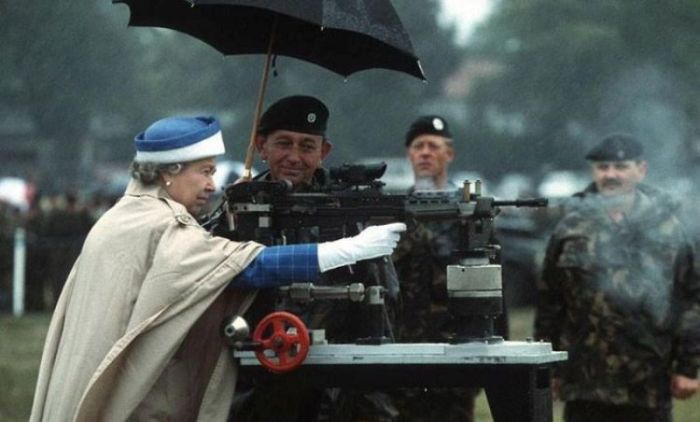Sure you can. Others have given a lot of reasons as for why the monarch can hold power, now let's also ask why we'd want the monarch to remain in power.
One of the more interesting views on this is the reknowned libertarian Hans Herman Hoppe, who wrote a book called Democracy: The God that Failed. He basically makes the case that a democratic government has some very shitty incentives that rewards splitting the population into voting block, taking from Paul and giving to Peter (because 51% of the population is Peter and the remaining 49% is Paul), and a lot of other "fun" things. He calls this the uncivilizing effects of democracy.
You can argue that Ukraine had a similar problem when "enthusiastic tourists" engaged with the public officials, so to speak, and Crimea left. And I am oversimplifying here, but bear with me.
You see, there was a big problem with Ukrainian politics, other than the fact that they were completely dysfunctional in a way otherwise only seen in a banana republic: They were essentially culturally and politically split. Down about the middle. This meant that the democratically elected government spent its time shitting on half of the population, and depending on which side had the most babies 18 years+ ago, the side that got shat on changed. This of course leads to very dysfunctional governance, because neither side will build up stuff, because the other side will just destroy it afterwards. I'm not saying that either side were good or bad here, they were both shit. However, shit is what survived under such systems.
When Crimea left, you had a new situation: The Crimeans were culturally Russian-friendly, and when they left Ukraina for the Rodina, the Russian-hostile/Western-friendly party had a permanent majority.
Imagine getting 40% of the votes in every election, and the only issue we're voting over are cutting your benefits and raising your taxes... You can't complain because it's democratic. This is the kind of problem (although I'm simplifying massively) that the easterners faced. Hence the revolt, hence the police action (it's not a civil war because then Ukraine can't get loans from the IMF to stay afloat) involving armoured columnns and artillery, and hence the general shit-show.
But imagine that there was a King. He had a 2-5% income tax or something as his only source of income. He had about 50% of the power. Now what interests would the King of Ukraine have? He wants to have money right? So he would not do anything that made people earn less money. He would in fact likely stop any shitting on any group as far as he could, because it would be against his interests. He would also oppose with a vigour seldom seen in politics against any robber-politician because while the politician will spend 5-10 years in office to take as many bribes as possible, looting the country and then just leaving, the King will spend his life as King, and he will pass the title on to his son. So he has a very, very real incentive to have political looters like that shot.
In such a state the Monarch would in fact be a massively stabilizing force because the elected officials cannot loot without his consent and to him looting does nothing but ruin him. And he wouldn't be alone either. He'd have a family who would definitively want to keep him around and stop him if he did something evil.
Therefore you could have had a stable Ukraine because there would have been a King/Tsar that would have had a vested interest in shit not hitting the fan. Ukraine's problems are pretty deep and complex (or rather there are two sides of shitty politicians that have taken their turns looting the country since the nineties, but that's a mean thing to say, but you'll never find Ukrainians really denying it..) and there are no obvious solutions except for federalization with extensive states' rights and forced neutrality. But you'd need something like a King or a Tzar to be able to wield enough powers for that shit to even begin to happen, so...
Summa summarum, kings can happen and they can have good stabilizing influence on a polity in such a way that the various groups in the country will trust him more than the democratically elected politicians.

